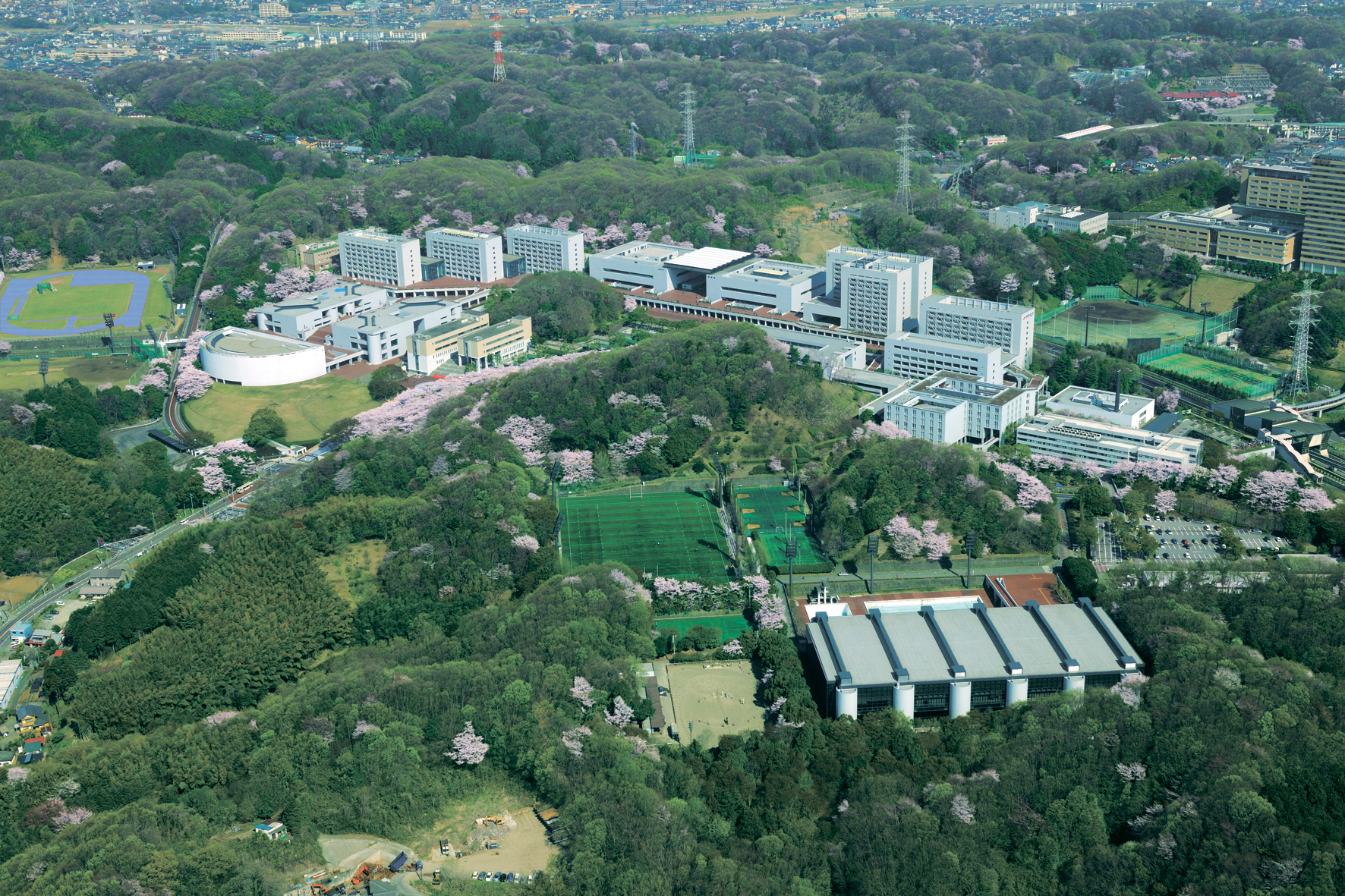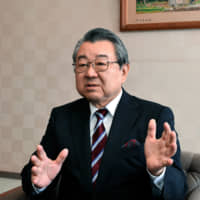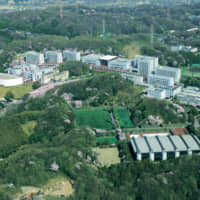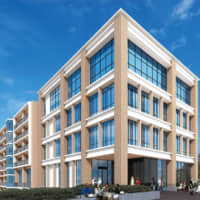Chuo University has long been renowned for being at the forefront of practical learning. In 2015 and upon celebrating its 130th anniversary since its founding, the school drew up the “Chuo Vision 2025” action plan in the pursuit of establishing a stronger global presence and competency.
Changing mission, role
Chuo President Tadahiko Fukuhara stressed that the changing role and mission of universities such as Chuo was behind the development of Chuo Vision 2025. He noted that the academic sector in Japan was now at the forefront of a transition period. He pointed out how universities were once a place of top learning where history and tradition were passed down to following generations. Universities also served as a platform for learning about the latest knowledge in various fields. “But with the progress of information technology, artificial intelligence can now conduct searches on numerous topics that were once accessible only through academic studies and research at universities. These conditions today in turn are prompting changes in the role of universities,” he noted.
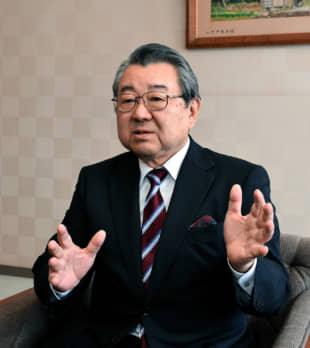
Fukuhara said that the mission of a university is therefore developing individuals capable of exploiting an innovative and bright future society, and that the goal of Chuo today is to produce professionals who can think and act globally. “Of note here is that a ‘professional’ is different from an ‘expert.’ While a person can become an expert by reading a manual and following its instructions, a professional must be creative and have the awareness to discover the true meaning of an existing problem on their own. Put another way, each person must have the ability to think about various solutions and choose the best approach through the smart use of AI,” he said.
This is one reason why each lecture at Chuo has now been extended to 100 minutes from previous 90-minute slots, allowing students to have ample time to think and discuss problems that have no specific, clear answers. Consequently, students can refine their skills to scrutinize, learn and make decisions on their own.
In today’s society that is not only unpredictable but changes with enormous speed, nobody knows the “right” answer. To successfully proceed through such an era of uncertainty, each person’s ability to think independently is more vital than ever before. “Hence, during their four years at Chuo, I hope all our students will develop their own ability their own strength to think strategically toward the future,” Fukuhara said.
Four pillars of development
Chuo Vision 2025 is a mid to long-term plan comprised of four basic approaches. “First is the reorganization and establishment of our educational organization. In that vein, we established two new faculties this April: The Faculty of Global Management at our Tama Campus, and the Faculty of Global Informatics at our Ichigaya Tamachi Campus,” said Fukuhara. As a result of this move, Chuo has come to offer 26 courses for undergraduate students at its eight faculties.
The second pillar of the development plan is the expansion and innovation of campuses to best realize the functions and attractiveness of the university’s Tama and urban campuses. The university is further consolidating the already modern facilities of its vast Tama Campus in verdant western Tokyo to attract more students from around the world. The Law Faculty will move from the Tama Campus in Hachioji to the university’s downtown campuses located around the Korakuen area.
Third is Chuo University’s strategy to reinforce its global education and research actions, in order to enhance its presence in the global academic arena. Chuo plans to accept an annual total of 1,000 overseas students by the year 2025, while dispatching 2,200 Chuo students yearly to foreign countries within the same period.
“In order to foster global-standard professionals, we also started the Global Faculty-Linkage Program in 2018. This is an all-school international education program conducted in English that fuses practical learning with overseas business experience. It is a program that is offered to all students from the second semester of their first-year of schooling,” explained Fukuhara.
The fourth pillar is Chuo’s efforts to promote sports. In addition to academia, Chuo stresses athletic achievement. As a member of the Japan Association for University Athletics and Sport, it has high hopes of sending students who excel in various sports to the 2020 Tokyo Olympics and Paralympics. Regarding next year’s Olympics, Chuo University received interest from a regional organization of national Olympic committees that the Tama Campus be used as their preliminary training ground, since Tama is the only university campus in Japan that has a concentration of modern pentathlon facilities — horseback riding, swimming, fencing, shooting and running — in one place. “I think such an opportunity to welcome top Olympic athletes from outside Japan will offer an excellent stimulus to our students,” Fukuhara observed.
Nurturing global citizens
As for the type of student Chuo wants to attract, Fukuhara emphasized competency. “In the so-called Society 5.0, it is not enough to only be literate and digest the necessary information from whatever is available. Instead, our students need to use their knowledge and skills and develop competence in proactively and creatively tackling issues that are yet to appear,” he said. Fukuhara believes that such competency is vital in order for individuals to lead the world from a global perspective, and that the spirit and mind needed to nurture the ability to execute and apply any acquired intelligence boils down to broadening competency.
He continued that Chuo’s present stance falls in line with the globalization efforts of the 18 young people who founded Chuo’s preceding English Law School in 1885. The youths visited various countries and fostered their skills in applying any acquired knowledge into practice. “I must point out here, however, that our students today must have further courage to tackle issues that cannot be solved merely from the experience and learning obtained from our predecessors. What is required is the will to use their own wisdom and competency to exploit a bright future, while contributing to establish a sustainable society for mankind,” noted Fukuhara.
Taking this view, the school provides overseas internship opportunities, as well as chances for students to apply global learning in Japan. One example is a collaborative relationship with The Japan International Cooperation Agency (JICA) in managing an internship project in Vietnam. There, Chuo’s law students are dispatched to JICA’s office in Hanoi to receive lectures on uniform application of law within the country, research on specific topics, and attend a seminar held at the Supreme People’s Procuracy, Vietnam.
New facilities
Concurrent with such moves, Chuo University is now establishing new facilities in Japan. Scheduled to open in April 2020, the “Global Building and International Education Residence Hall” near the on-campus monorail station at Tama will serve as a platform for conducting global education research. These facilities will also allow the school’s Japanese and foreign students to truly become “global” by studying and living together. “Such an experience will definitely contribute to enhance mutual understanding of different cultures, tradition, customs and food,” Fukuhara commented.
The construction of another building for shared use by all faculties is further proof of “going global.” Scheduled to open in 2021 at the Tama Campus, this cross-faculty building will serve as the nucleus of Chuo’s global diversity zone, as well as a place of learning and exchange among its students. “Put another way, this will become an arena that concentrates our knowledge, learning and intelligence through true globalization,” explained Fukuhara.
President’s philosophy
“Education and research are unchangeable aims of universities. However, bold change of its missions and role in line with social development is also a vital university’s duty. Following founding spirit -fostering the ability to apply knowledge to practice- Chuo keeps challenging,” Fukuhara concluded.
Chuo University

Address: 742-1 Higashinakano
Hachioji-shi, Tokyo, 192-0393 Japan
Tel: +81-42-674-2211
E-mail: [email protected]
URL: http://global.chuo-u.ac.jp/english/



